Illinois Baptist
When God sends a detour
Table Talk with Van Kicklighter P. 9

Table Talk with Van Kicklighter P. 9
REPORTER’S NOTEBOOK
J.D. Greear to run
Field report confirms SBC political season arrived early P. 8

NATE ADAMS
Yes, I’ve changed
Starting a church made me expect something different P. 2
SECTION B
Missions commitment




Annual report on churches’ Cooperative Program giving
Church leaders face into a new cultural climate
PIONEERING SPIRIT
Amid decline, churches called to new commitments
Springfield | Throughout 2018, Southern Baptist churches in Illinois are invited to accept challenges in four key areas: evangelism, church planting, missions giving, and leadership development.


The challenges, focused on the “pioneering spirit” needed to advance the gospel among more than 8 million lost people in Illinois, were laid out last November at the Annual Meeting of the Illinois Baptist State Association. Their urgency was reinforced by new data based on the 2017 Annual P. 3 ADAMS



Many practicing Christians who are also Millennials report feeling pressured or conflicted because of their faith. – Barna Trends 2017
Barna asked individuals who consider themselves a “person of faith”: Thinking about your faith, how do you feel, personally, in society today?
the cooperative program
Budget Goal: $484,615
Received to date in 2017: $322,647
2018 Goal: $6.3 Million
Editor - Eric Reed
Managing Editor - Meredith Flynn
Graphic Designer - Kris Kell
Contributing Editor - Lisa Misner
Multimedia Journalist - Andrew Woodrow
Administrative Assistant - Leah Honnen
The general telephone number for IBSA is (217) 786-2600. For questions about subscriptions, articles, or upcoming events, contact the Illinois Baptist at (217) 391-3119 or IllinoisBaptist@IBSA.org

The Illinois Baptist is seeking news from IBSA churches. E-mail us at IllinoisBaptist@IBSA.org to tell us about special events and new ministry staff.

POSTMASTER: The Illinois Baptist is owned and published every three weeks by the Illinois Baptist State Association, 3085 Stevenson Drive, Springfield, Illinois 62703-4440. Subscriptions are free to Illinois Baptists. Subscribe online at IBSA.org.
 NATE ADAMS
NATE ADAMS
Church planting changed me. It was a fundamental change that has continued to influence not only the way I think and feel about church planting, but also the way I think and feel about churches in general.
Before planting, I saw the church as an organization that primarily served its members. It was the group of people that employed my dad, and later me as a youth minister. Our job was to lead worship services and classes, plan programs and activities, and nurture positive relationships. The church membership’s job was to participate, learn more about the Bible, and relate to one another with love and service. Sometimes new people visited and considered joining us.
During and after planting, I saw the church as those who seek and save the lost, and help nurture them into maturing believers who also seek and save the lost. As disciples, we worshiped and studied the Bible and enjoyed fellowship and served. But those weren’t the primary focus; they were things we did along the way as we pursued the mission of seeking and saving the lost.
When we left our church plant in the hands of its first full-time pastor and moved to Georgia, we were fortunate enough to find a church that was still behaving like a church plant. Frankly, we had to visit several churches before finding it, and it was a half hour from our home. But it was worth it.
Though this church had its own building, full-time staff, and basic programs, it was clearly focused on engaging and serving its community, more than its members, and on being an inviting environment that expected guests every week. It created multiple entry points for the unchurched, and trained its members to engage them with relationship and with the gospel.
How can we prioritize the lost and unchurched?
It doesn’t seem right to characterize my before-planting view of church as self-serving, because other church members and I often served each other selflessly. Sometimes we would even invite unsaved friends to what we were already doing, and sometimes we would go on mission trips to look for unsaved people. But we didn’t re-order our thinking and plans and resources toward the lost and unchurched. So, as a church, we were basically self-serving.
This fundamental change in my own life is on my mind and heart right now, because 2017 Annual Church Profile reports have just been totaled. They tell us that total baptisms reported by IBSA churches were lower by more than 11% for the second consecutive year. And about 40% of reporting IBSA churches did not record a baptism.
I love our IBSA churches, including the ones that didn’t see a baptism in 2017! I see so many positive ministries and sacrificial servants in every church I visit, and I recognize that churches are in different situations and settings, and have different strengths. If the gospel is proclaimed faithfully and the Lord Jesus is worshiped sincerely, and believers are maturing and serving, then there is much to celebrate.
At the same time, I would invite us all to simply ask whether a fundamental change is needed in our perspective. Many, many good things happen in a church where the members worship God and serve one another. But the best thing happens when the lost are saved and welcomed into the family of God. And that happened almost a thousand times less in our churches over the past two years.
For me, planting a church brought fundamental change to my heart and mind, that the church should seek and save the lost as its first priority. That’s now what I look for, and long for, in every church I enter. I believe it is the fundamental change that is needed in many churches, to reach the millions of lost people that live in our Illinois mission field.
Nate Adams is executive director of the Illinois Baptist State Association. Respond at IllinoisBaptist@IBSA.org.

Church Profile reports completed by 95% of IBSA churches.
“The 2017 ACP data from IBSA churches tells us that, while some churches are thriving, many are struggling,” said IBSA Executive Director Nate Adams. “For example, about 40% of IBSA churches didn’t report a baptism in 2017. And the sum total of information from all churches shows flat or steadily declining dynamics in many key indicators, including baptisms, worship attendance, Bible study participation, and church planting.

“This doesn’t do justice to the many bright spots where effective ministry and growth is happening, but it does give an overall picture.”
In 2017, IBSA churches baptized 3,441 people, a 13% decrease from last year’s total of 3,953. Other measurements also were down, including professions of faith, church membership, and missions giving. Giving through the Southern Baptist Cooperative Program totaled $5,924,029 in 2017, compared to $6,032,407 the previous year.
A highlight of 2017 was growth in the area of missions participation, as 21,607 people engaged their Acts 1:8 mission fields through projects and partnerships.
“It was studying last year’s ACP numbers, and really the last several years’, that led us to the important theme for the 2017 IBSA Annual Meeting,” Adams said. “Advancing the gospel through Baptist churches in Illinois has, and always will, require a ‘Pioneering Spirit.’ That means continuously engaging new people, developing new leaders, making new sacrifices, and going new places with the gospel.
“Churches that are not intentionally and effectively reaching out into their communities with a pioneering, missionary spirit, face inevitable decline.”

The lower numbers in Illinois reflect national trends, according to the most recent data available. (National ACP data for the previous year is released in the summer, prior to the annual Southern Baptist Convention.) In 2016, baptisms in SBC churches decreased by 4.9% from the previous year, and worship attendance declined 6.8%.

“I would encourage any church that is struggling or simply desiring assistance to invite IBSA, its local association, or perhaps another likeminded church to come alongside and help,” Adams said. “Often another trusted leader’s perspective can make all the
difference, along with the experience and resources that others can bring.
“For our part, IBSA is eager to bring training, consulting, and resources in any of these areas, and to any IBSA church. That’s why we’re here, and we really want to help.”
The power of ‘one’
A decline in baptisms over the past decade is behind this spring’s “One GRAND Sunday” emphasis, which calls IBSA churches to participate in baptizing at least 1,000 people on April 8, the Sunday after Easter.
Last year, 352 IBSA churches reported zero baptisms. The churches that did report baptisms had an average of 6.4 baptisms per church.
The ‘GRAND’ goal is lofty, IBSA’s Evangelism Director Pat Pajak has acknowledged, particularly amid the current downward trend. But he’s urging church members to focus on the “one” part of the challenge, and to pray for one person to come to Christ and be baptized. That idea was recently echoed by prayer leader Phil Miglioratti
“And as my ‘one’ is added to your ‘one’... as their church’s ‘one’ is matched by that church’s ‘one’...as a Sunday class prays for ‘one’ and is joined by a fellowship group asking for ‘one’...a youth group in a southern association, a seniors’ class in the center of the state, a planting team up north, a children’s ministry along the eastern border, and a WMU along the western border, each claiming, petitioning, pleading for ‘one’...one plus one equals two. But in God’s mathematics, ‘one’ plus ‘one’ times prayer could equal ‘One GRAND Sunday!’
“Even the smallest church among us can ask in faith for ‘one,’” Miglioratti said.




Vice President Mike Pence cast the deciding vote in confirming Sam Brownback as the nation’s ambassador at large for religious freedom. The Kansas governor, who is the first Catholic to serve in the post, needed Pence’s vote to break a 49-49 tie in the U.S. Senate. “Religious freedom is the first freedom,” Brownback tweeted after his confirmation. “The choice of what you do with your own soul. I am honored to serve such an important cause.”
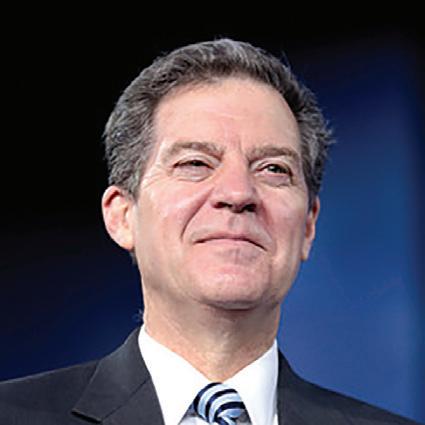
A Christian student organization deregistered by the University of Iowa was temporarily reinstated after a district court judge ruled in their favor.

Judge Stephanie Rose said the university had selectively enforced its “otherwise reasonable” nondiscrimination policy by deregistering Business Leaders in Christ (BLinC) in November, after a former member said he was not allowed to become a leader in the organization because he is gay. The court case is ongoing.
Florida lawmakers are considering a resolution that declares pornography to be a public health risk. The House Health & Human Services Committee approved the resolution Jan. 18; a similar Senate resolution has yet to be heard in committee, according to the Orlando Sentinel
In defense of the resolution, sponsoring Rep. Ross Spano noted pornography’s adverse effects on a person’s health and relationships, as well as its correlation to “deviant, problematic, or dangerous sexual behavior.”
– Christianity Today, The Gazette, Orlando Sentinel Get breaking news in The Briefing online, posted every Tuesday at www.ib2news.org.

The Bible has a lot to say about caring for orphans. Protestant churches in the United States appear to be listening.
About 4 in 10 Protestant churchgoers say their congregation has been involved with adoption or foster care in the past year, according to a study by LifeWay Research, which conducted the survey Aug. 22–30.
Washington D.C. | More than 20 pregnancy centers in Illinois have filed a friend-of-thecourt brief in support of California pregnancy centers that are facing a challenge to their mission to provide abortion alternatives.
Chicago-based law firm Mauck & Baker filed the brief with the U.S. Supreme Court Jan. 11 in the case of National Institute of Family and Life Advocates (NIFLA) v. Becerra. The case is based on California’s 2015 Reproductive FACT Act, which forces pregnancy centers to inform clients about public programs that provide family planning services, including abortion.
Illinois pregnancy centers have faced similar legislation. Last year, Mauck & Baker along with the Alliance Defending Freedom won an injunction in Illinois Federal District Court stopping lawmakers’ efforts to enforce a 2016 amendment to the Healthcare Right of Conscience Act, which forced medical professionals to inform women where they could obtain abortions. Hawaii has a similar law in place.
“Illinois centers contend that they, like the California centers, are also being targeted by state efforts to force them to provide proabortion information to those who come to them for support,” Mauck & Baker said in a release.
any and all dissent that would threaten their industry of death.
“I’m hopeful the Supreme Court will rule against these efforts that aim to steamroll groups serving vulnerable women.”
– LifeWayResearch.com
Since the early 2000s, many Protestant churches have commemorated “Orphan Sunday” every November to draw attention to the plight of orphans around the world. In the past, they’ve often focused on international adoption and orphanages. But in recent years, foster care—both in the United States and abroad—has become a focus as well.
LifeWay Research’s survey of 1,010 churchgoers— those who attend a Protestant or nondenominational church at least once a month—found 25% say someone from their church has been involved in foster care over the past year.
On the topic of adoption, 17% say someone from their church has adopted a child from the U.S. in the past year, and 15% say someone from their church has adopted a child from another country.
Still, church leaders in general don’t talk much about adoption, according to LifeWay Research’s survey: Only 14% of churchgoers say church leaders have encouraged families to consider adoption, while 12% say church leaders encouraged them to become involved in foster care.
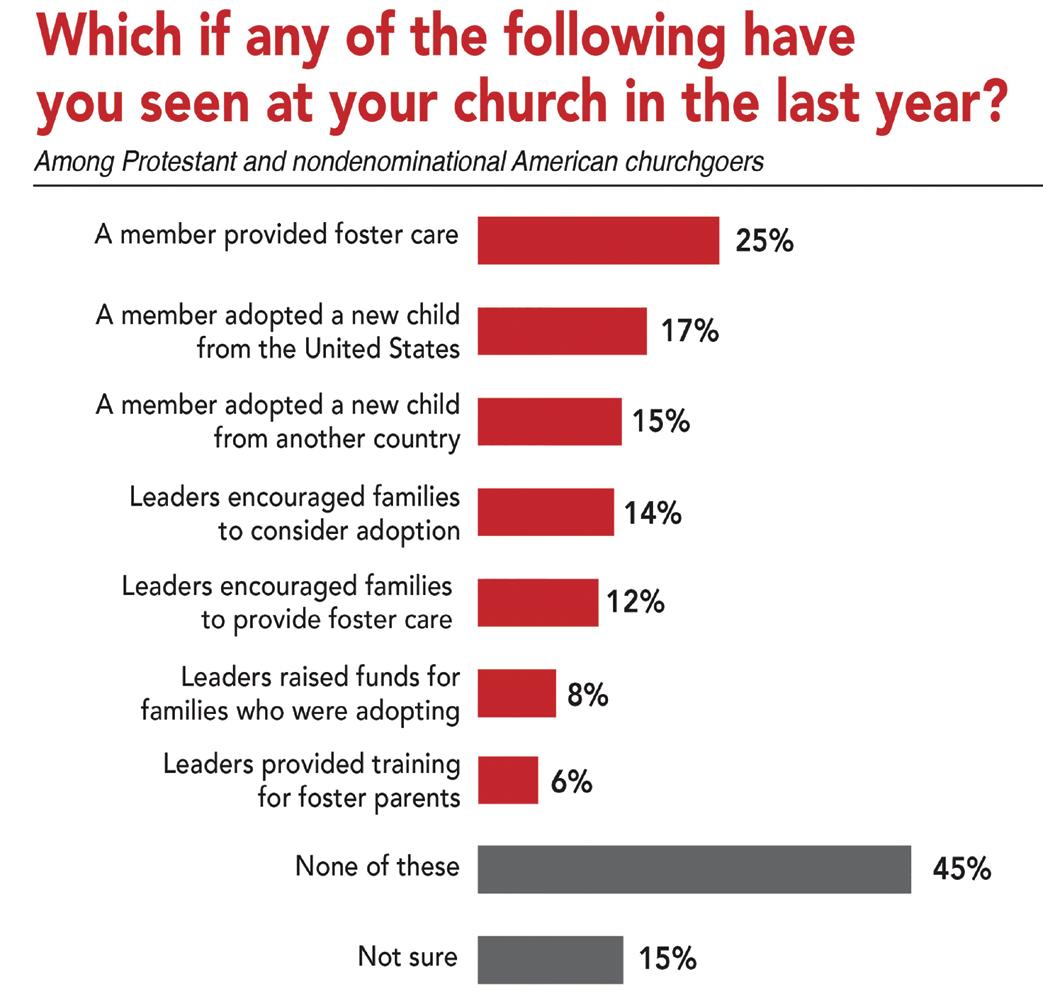
The number of adoptions in the U.S. has declined slightly in recent years, according to the National Council on Adoption, from 133,737 in 2007 to 110,373 in 2014. That coincided with a decline in international adoptions, which dropped from a high of 22,989 in 2004 to 5,370 in 2016, according to the State Department.
According to a 2015 report from the Adoption and Foster Care Analysis and Reporting System, 427,910 children were in foster care, with 111,820 waiting for adoption.
– From Baptist Press
If the justices uphold the California law, pro-life centers would be forced to notify their clients of the availability of abortion services elsewhere, or face a fine of as much as $1,000 a day. The Supreme Court said Jan. 24 it would hear oral arguments in the case on March 20. The justices are expected to issue a ruling before they adjourn in late June or early July.

The Southern Baptist Ethics and Religious Liberty Commission (ERLC) filed its own amicus brief in the case on Jan. 16.
“The outrageous demands being made in this case strike at the very heart of the freedom this nation has always sought to uphold and protect,” said ERLC President Russell Moore. “Time and again, we see the abortion industry maneuvering to silence
The ERLC joined the National Association of Evangelicals, Concerned Women for America, National Legal Foundation, and Samaritan’s Purse in its brief.
The California legislature in its findings regarding the Reproductive FACT Act “showed disapproval of the anti-abortion message of the pregnancy centers and the desire to rein in that speech by compelling the centers to declare a pro-abortion message,” the brief says.
The ERLC and the other organizations point out that various federal courts of appeals disagree on what standard of review to use in “compelled speech cases involving abortion notices.” They argue the high court should apply strict scrutiny as the uniform standard, which is the highest standard in the U.S. legal system, requiring the government to show it has a “compelling interest” and is using the least restrictive means to limit a constitutional right.
According to the ERLC’s brief, California’s law “compelling pro-abortion speech at pregnancy centers committed to a pro-life viewpoint does not satisfy strict scrutiny and is, therefore, unconstitutional.”
Carmi | Illinois Baptist Children’s Home and Family Services celebrates its centennial in 2018, with an emphasis on the faithfulness of Illinois Baptists—100 years ago and now—to support vital ministries to children and families.
The biggest event this centennial year is BCHFS’ annual fall festival in Carmi, said development and communications director Ken Steward. The festival is planned for Sept. 15.
“The ministry of Baptist Children’s Home was really born out of the faith, sacrifice,
and vision of Illinois Baptists,” Steward said, recounting how 20 families risked losing their farms and livelihoods to fund the purchase of 40 acres of land to house an orphanage. That facility, built after World War I and an influenza outbreak had left many children in need, was the start of a ministry that has expanded to care for young mothers, adoption and foster care services, and a network of counseling centers across the state.
For more information about BCHFS and updates on its centennial year, go to BCHFS. com.

 BY KAYLA RINKER
BY KAYLA RINKER
Springfield | Ministry in the Midwest has ups and downs, successes and struggles. The work of advancing the gospel in a diverse, large region requires creativity, perseverance, and a willingness to sacrifice personal preference.
With their common calling in mind, more than 1,000 leaders from 13 Midwest states gathered in Springfield Jan. 23-25 at the Midwest Leadership Summit, a meeting organized every three years by Southern Baptist state conventions in the region.
“We share the same love for our communities and vision to see people come to Christ,” said Tim Burgess, a pastor in Mt. Vernon, Mo., “and getting together is a great reminder that we are not working at this alone.”
The large-group sessions and more than 90 breakouts tackled specific ministries—college campuses, church planting, missions, women, youth, and Disaster Relief, to name a few. Underlying each session was the need to advance the gospel in a culture that’s moving farther away
Sharpening focus
Church leaders from across the Midwest packed into a ballroom at Springfield’s Crowne Plaza Hotel for the opening session of the 2018 Midwest Leadership Summit. The meeting, held every three years, offers training in a variety of specialties and opportunities to network with Baptists from neighboring states.
from biblical truth. In our culture of change, one thing has stayed the same, said Detroit’s Darryl Gaddy.
“You look around and notice that nothing stays the same,” said the urban church planting specialist in his keynote address to open the Summit. “Nothing is as it was ten, five, or even two years ago.
“But actually there is one thing that does stay the same. Sin. Oh, the consistency of brokenness. It never takes a vacation. But friends, we are the church. And we, like Peter who raised the lame man up in the name of Jesus Christ, are called to speak into the brokenness.”
Gaddy urged Midwest leaders to be “agents of change” in their communities, which will require obedience when it’s not convenient, becoming less so others can become more, and giving up their rights to someone else—Jesus.

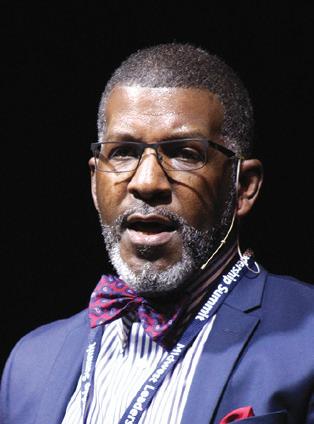
“We have received information for our heads, inspiration for our hearts, and implementation for our hands,” Gaddy said. “Let’s not leave here the same way we came.”
Like the Midwest itself, leaders in Springfield for the Summit represented a wide variety of contexts, including places where new churches are making inroads into previously unreached communities. North American Mission Board President Kevin Ezell facilitated a discussion with four

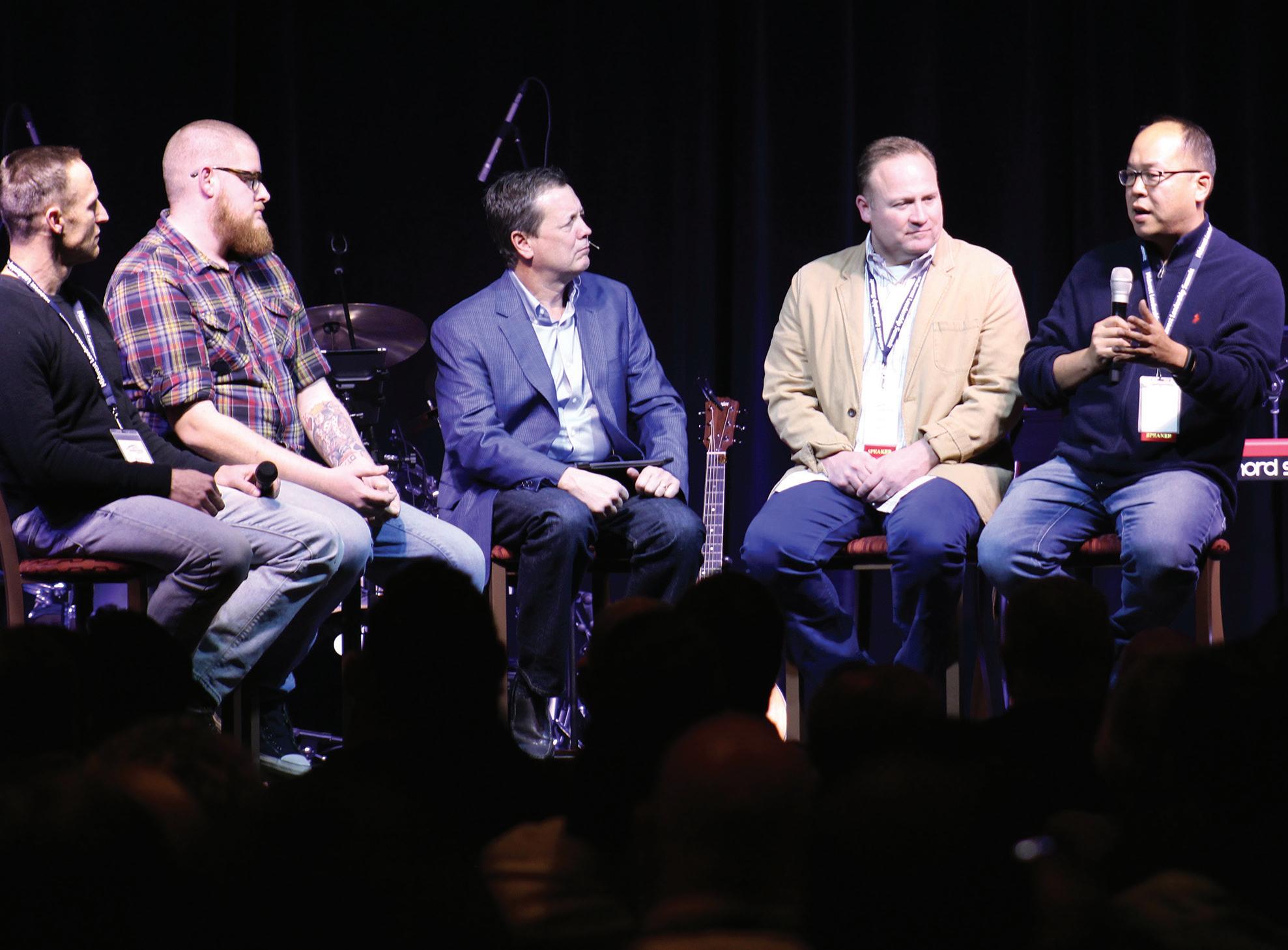
planters who took to the main stage to talk about strategy, cooperation, and the power of prayer.
“There is a quote that I always go to when I think about our church,” said David Choi, pastor of Church of the Beloved in Chicago. “When men work, they work. But when men pray, God works. The great church planter is the Lord. Recruit prayer warriors to lift up your ministry because that’s truly the secret sauce.”
In a few years, Choi’s church has grown from one—himself—to encompass hundreds meeting for worship every weekend. He credited God for the growth, and the prayers of people who live far from his city but have made it a point to lift up Church of the Beloved.
Ezell also introduced Paul Sabino, pastor of Candeo Church on the campus of the University of Northern Iowa in Cedar Falls. Sabino is part of The Salt Network, a family of next-generation churches working together to plant churches in
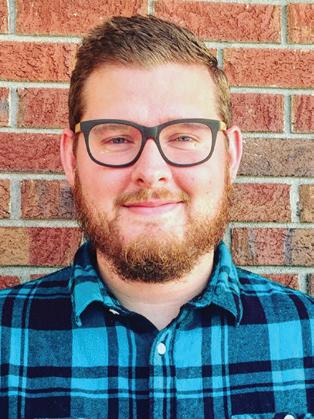
Twitter users posted some of the meeting’s most memorable quotes “Multiplication is not just what we cast as a vision, it’s DNA that’s in the Bible.… There’s not this big division, are you a church planting church? No, we’re a New Testament church.”

Will Basham,
major university cities.
“We are seeing the power of God on us and it’s like holding a Dixie cup; it’s overflowing and we can’t contain it,” Sabino said. “Jesus said he would make us fishers of men. The fish are on college campuses and they are hungry. They are crying out for the living God to impact their lives.”
The focus on church planting was encouraging for Christine Watkins, who came to the Summit as a member of Jachin Baptist Church, a 10-month-old church plant in Flint, Mich. Her husband, Derrick, is pastor of the church named for a word found in 1 Kings 7:21. Jachin means “the Lord will establish,” Watkins said.
“I think attending this summit and hearing all the great knowledge and stories of how God has blessed young church plants is part of how God is opening doors and giving direction in how he is going to establish our church.”
“Not everyone is called to be a church planter, but everyone is called to be about church planting.”
– Daniel Im, director of church multiplication for LifeWay Christian Resources
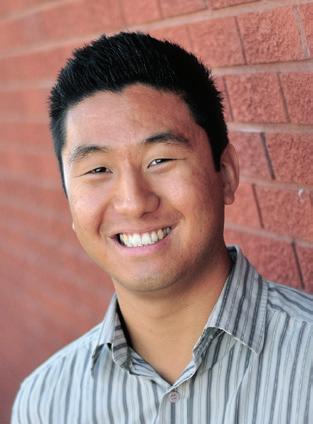
“The traditional church has run its course. Hurting people are looking for a church that will do something different.”
– Darryl Gaddy, urban church planting specialist, Detroit, Mich.
MEET, GREET, EAT – More than 300 leadersfrom
Illinois attended the Summit. Many gathered during a state networking time Tuesday evening.– West Virginia church planter and planting catalyst
‘Pray bigger prayers’
Jeff Iorg, President of Gateway Seminary in Ontario, Ca., understands what it means to advance the gospel in difficult environments.
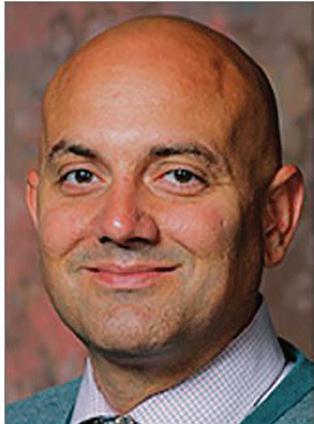
“Much of what you are experiencing now in the Midwest we experienced 30 years ago in California,” he said during the Summit’s final session. “It seems like an impossible task with formidable obstacles…Yet, I’m here to tell you the gospel is advancing on the West Coast, and healthy churches are growing with denominational influence and cooperation.”
Iorg said the reason for the gospel’s advancement, especially in a hostile cultural environment, can be found in John 14.
“Jesus said in verse 12, ‘I assure you: The one who believes in me will also do the works that I do. And he will do even greater works than these, because I am going to the Father.’
“‘And he will do even greater works than these’—that is quite a sober declaration of Scripture,” Iorg said. “Do you believe the word of God? Do you believe Jesus meant what he said?”
Iorg encouraged leaders to pray and ask God for what is worthy to be asked for in
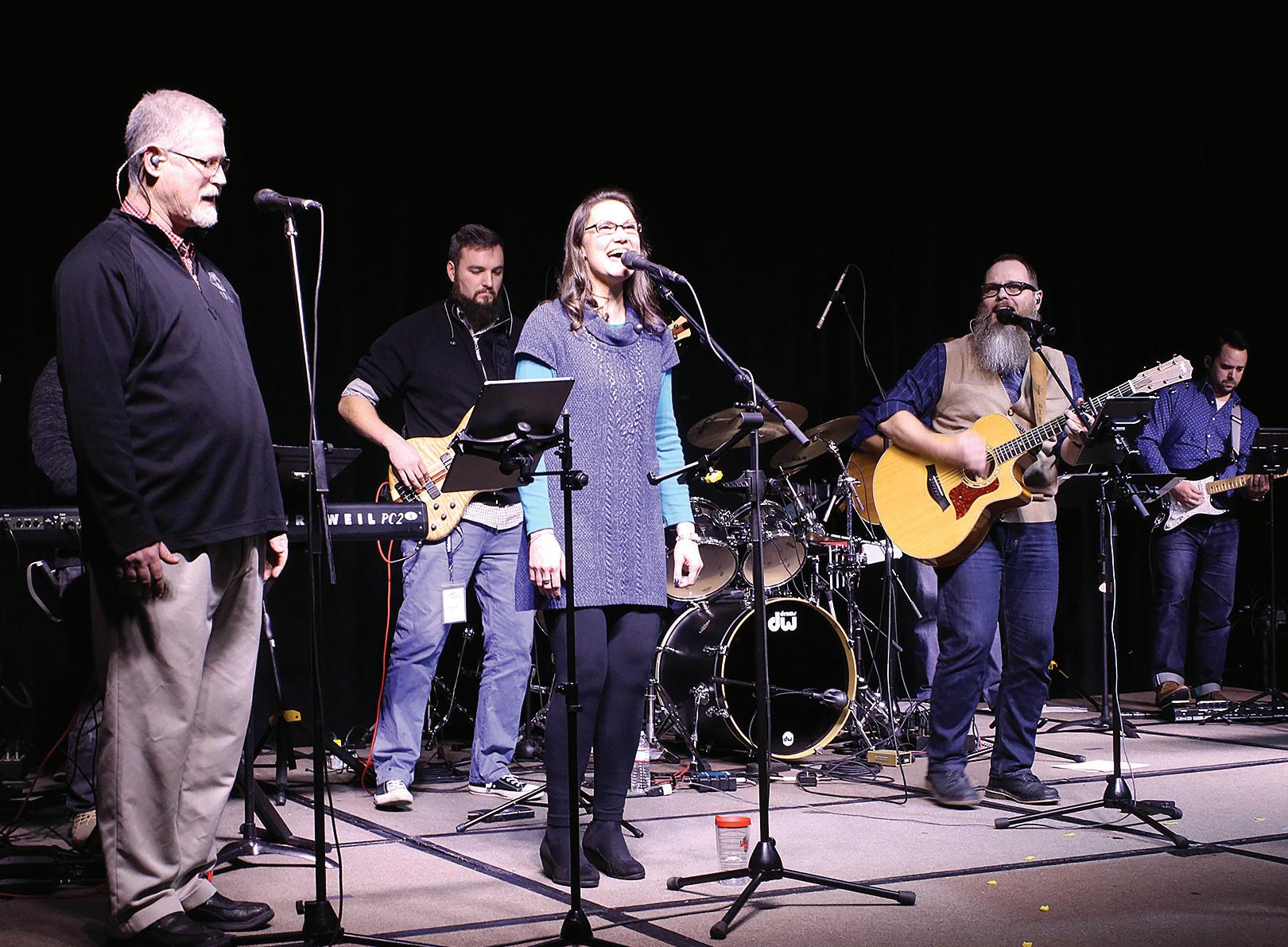
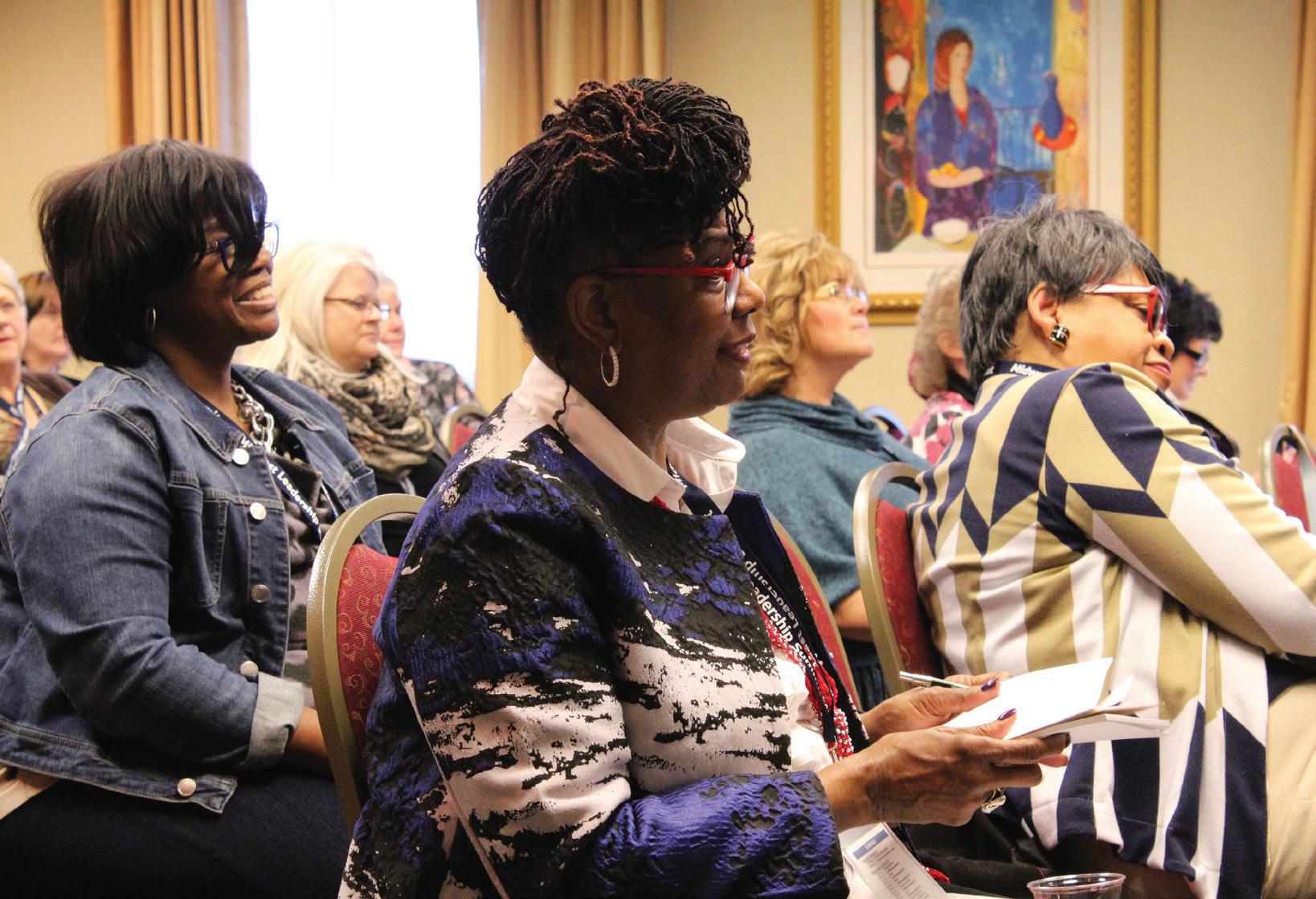
Jesus’ name and to surrender control to the Holy Spirit.
“Confess your powerlessness and ask the Holy Spirit for the filling, guiding, and directing,” he said. “So often, we start to rely on our own strategic plans. That’s not going to work. We must depend on the filling of the Holy Spirit to get the mission done.”
The last step to advancing the gospel in this cultural environment is to teach people to read, understand, and obey the Bible. Iorg said the only time he has seen people transformed is when they engage God’s Word.
“No games, no gimmicks,” Iorg said. “Pray bigger prayers in the name of Jesus. Work in the Holy Spirit’s power and trust him to do supernatural things in you. And find a way to teach people to internalize the Word of God. That’s it. Now let’s go home and do it.”
Kayla Rinker is a freelance writer living in Missouri.
“I gained better insight on how to evangelize Millennials. I’m re-looking at the dynamics of church and the things you used to do that don’t work anymore. It’s not about religion, it’s about relationships.”
– Gary West, pastor, North Benton Baptist Church, and director of missions, Franklin Association
“I liked the diversity of the tracks available to different people in different contexts. Because I’m from southern Illinois, I’ve got to say, it was a buffet of learning.”
– Matt Crain, pastor, First Baptist Church, Christopher
“My favorite part was the worship time. It was great being together with other brothers and sisters in Christ, worshiping together the One who created us all.”
– Brianna Trowbridge, pastor’s wife, Samaria Missionary Baptist Church, Albion
“I came to be refreshed and renewed and to learn to be better in my evangelistic leadership role in my church and association. I came away with ideas, and very encouraged and challenged to be better.”
– Jerry Montgomery, pastor, Casey Avenue Baptist Church, Mt. Vernon
“We are part of a small church in a rural community and this Summit has been full of great information that we can take back with us and mull over. We may not change the world, but if we implement some of the ideas and strategies we learned here, we might see something great happen in our community.”
– Janet Yocum, member, Mullen Baptist Church, Montrose
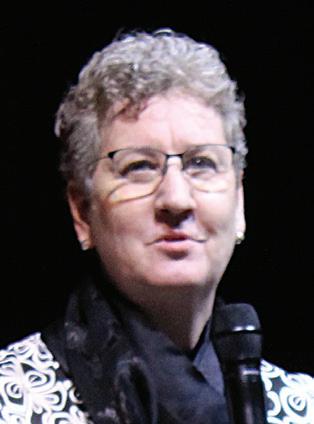
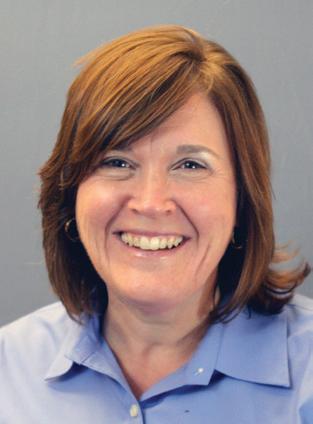
–
“We
– Josh Whetstine,
missionary
“Father, stir our hearts. May we have a passion for taking the gospel to the lost. Free us from distractions. May we have a passion to take the gospel to the nations. May it be so.”
“Do not be guilty of being the leader that didn’t help somebody grow, but let them stay where they were because it was easy.”
Carmen Halsey, IBSA director of women’s ministry and missions
aren’t seeing Pentecost and it’s not because we’re not praying enough, it’s because we’re not saying enough.”North American Mission Board in Minneapolis-St. Paul – Sandy Wisdom-Martin, executive director-treasurer of National Woman’s Missionary Union Videos of the main conference speakers and about 30 breakout sessions will be posted over the next month at MWAdvance.org. RE-VISIONING – Gwendolyn Sutton (center) listens as LifeWay’s Kelly King teaches on developing a new vision for women’s ministry in one of more than 90 breakouts offered at the Summit.
People sometimes feel like this law of multiplication is unfair....They make a few bad decisions, and when life falls apart, they think, “Well, I know I haven’t always made the wisest decisions, but I don’t deserve all this.” But what they are experiencing is probably not punishment; it is harvest…
I can’t tell you how many Christian parents are surprised when their kids go off to college and walk away from the faith. “But we raised them in church,” they say. But were church and your walk with God really that important to you? You attended sporadically. You didn’t volunteer. You weren’t in a small group. You didn’t do missions or serve with your kids or read the Bible together or pray together. Your kids weren’t involved in the student ministry. You frequently missed church for sports events or dance or trips to the beach. You raised your kids around God, but he was only a second-tier priority.
Is it any surprise, then, that this nonchalant attitude multiplied in your kids’ lives when they went to college? Your half-commitment wasn’t just replicated in your kids. It multiplied in them.
Now, I want to be clear that this isn’t an ironclad rule. Kids leave the faith for a number of reasons. But I’m concerned that what many parents—Christian parents—are sowing in their kids is a little bit of Jesus and whole lot of materialism.
– Excerpted from Baptist Press
It’s political season. I’m not talking about the Illinois gubernatorial primaries or the mid-term congressional elections coming in November. It’s time for potential SBC candidates to declare their intentions. Will they or won’t they run?

It’s almost as if the groundhog has poked his head out of his hole in early February and determined that denominational election season has begun. Sometimes the furry pundit will duck and cover another six weeks while leading pastors determine whether their friends will support their nomination for president. J.D. Greear has made his announcement. SBC political season has sprung.
Greear made his announcement Jan. 29, a commitment to the gospel as the SBC’s source of unity, with essentially the same planks as his 2016 platform: “cultural and racial diversity”; “intentional, personal evangelism”; “church planting”; and “engagement of the next generation in cooperative giving and mission.”
A week ago, Baptist Press published a column by the North Carolina pastor. You don’t reap what you sow, Greear said, you reap much more. One kernel doesn’t produce one more kernel. It produces hundreds or even thousands, whether for good or evil. The essay sounded like the 44-year-old Greear
When you vote on March 20th, a question will be on the ballot about legalizing marijuana in Illinois for 21 and older.
Colorado legalized pot in 2013. What’s happening there is tragic:
66% increase in pot-related deaths
72% increase in pot-related hospitalizations
Colorado youth now rank #1 in the nation for past month use
Colorado college-age adults now rank #2 in the nation for past month use
8%-10% of newborns now test positive for marijuana at St. Mary-Corwin Hospital in Pueblo, Colorado
There are 491 marijuana stores in Colorado, compared to 392 Starbucks and 208 McDonald’s
Crime rose 17% and the Black Market is thriving
THC is what causes the “high.” In the 70’s, THC levels were 2%-3%. THC levels in today’s products are 20%-90%.
THC potent products have caused violent psychotic episodes, poisonings, and even death.
Marijuana is not at all like alcohol. Smoking or eating even a small amount of marijuana will result in intoxication. Moreover, marijuana stays in your system and can affect fine motor skills for 72 hours or longer.

Scripture exhorts us to be sober minded (1 Peter 4:7 & 5:8; 1 Thes 5:16; Titus 2:2; 2 Tim 4:5; Rom 13:13) and warns against intoxication repeatedly (Eph. 5:18; Gal. 5:21; Prov. 20:1; Is 5:22). Instead, Christians must recognize that we are not our own, but are called to do everything for the glory of God and be filled with the Holy Spirit (1 Cor. 6:19-20; 10:31; Eph. 5:18).
preaches to 10,000 weekly worship attenders, mostly young adults and families. It was practical and punctuated with relatable illustrations.
The column served to remind us that Greear was waiting in the wings, and we wondered if he was ready to move to center stage.
Greear certainly had everyone’s attention at the 2016 Southern Baptist Convention in St. Louis. After two ballots that produced a near tie with Memphis pastor (and Adrian Rogers successor) Steve Gaines, Greear withdrew from the race prior to another run-off that might have proven divisive. The race between younger-Reformed Greear and the older proponent of traditional evangelism, Gaines, was seen at the time as a fork-inthe-road for Southern Baptists. But Greear’s voluntary withdrawal deflected the issue and produced a palpable sense of unity as we left St. Louis. The photo of Greear, Gaines, and then-SBC President Ronnie Floyd hugging and praying at Greear’s withdrawal sticks in our minds as the best image of the 2016 convention.

Well, here we are again. As we wait to see who else may run, the questions arises: Will this be a return trip to the fork-in-the-road, with the hand-off to a younger generation and a shift in theology confirmed?
The slate will tell.
Trinity offers more than 70 programs of study, providing an education that is grounded in scripture with real world experience. Since we’re located just 25 miles north of Chicago, you’ll have the opportunity to live, learn, and serve where you can engage with the world and shape your community.
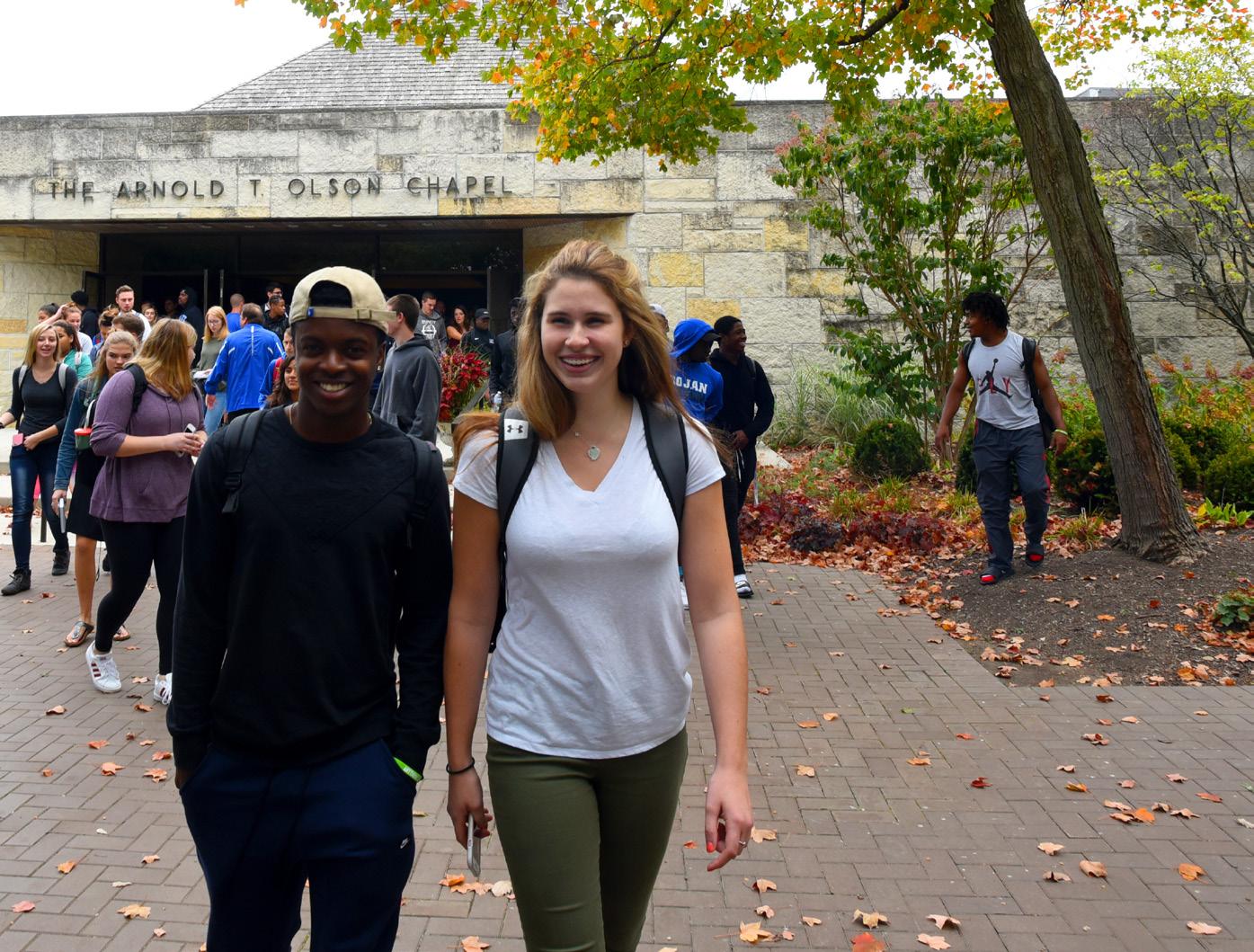
I learned to drive when finding your way around still involved maps—ones that were printed on paper with different size dots to represent population, and different width lines to represent what kind of road it was. To get from place to place, you would locate where you were and where you wanted to go and, most of the time, map out the shortest distance.
This worked well until you came to one of those big orange triangular signs that said “Detour.” Typically, you would be directed off the road with a sign or two and then left to your own resources to find your way back. The objective was to get back to the main road as soon as possible so you could continue your journey. On occasion, getting back to the main road seemed impossible, and you had to find a new way to get to your destination.
Personally, my life recently took a detour (with a cancer diagnosis). Not only am I now on a different road, I am headed for a new and different destination. To be honest, my wife, Robin, and I aren’t sure we know what the new destination will be. This detour is not simply a short-lived excursion, it is a brand-new road.
Sometimes God takes our lives on a detour, at least from the plans we have laid out and from the destinations we were headed toward. And trying to get back to the old road, the former route, is to miss what God wants to do in our life. As one author puts it, the detour has become the new road.
What do we make of this? Is God playing a mean trick on us, or has he changed his mind about his purpose for our lives?
As I have thought (and prayed) about this, I have come to a new understanding and appreciation for what God might be doing when he interrupts our personal road maps and seeks to take us to a new destination.
Even a cursory reading of the Bible reveals that many of God’s choicest servants, men and women, experienced some incredible detours. Consider Abraham, who was told to leave his home land and go to a place God would show him (eventually). Ruth, a young bride-turned-widow, also journeyed to a foreign land. Peter, Andrew, James, and John left the
family fishing business to wander with Jesus, and the Apostle Paul detoured from persecuting the church to being the planter of churches.
These are just a few of the dozens of examples we could mention. Let me suggest a few possibilities for what God might be up to in the detours of life:
1. You detoured when you trusted Jesus. The truth of the gospel is that we were enemies of God until he intervened and offered us salvation through Jesus. In our old life, we charted our own destination, and it was leading us to separation from God. Our repentance—doing an “about face”—represents the first and most important detour as a disciple of Jesus.
2. Your detour may last for many years before you see the benefit. Joseph was enjoying his time as the favorite son of a wealthy father. Then his broth-

ers threw him in a pit and left him for dead. He was sold into slavery to a foreign king and later thrown into prison, even though he did nothing wrong. Quite a life-changing detour! But after decades and several more detours, Joseph’s position in the foreign land was used by God to meet the need of his people in a time of severe famine. You may not see the benefit or the blessing of a detour for many years to come.
3. Your detour may have a Kingdom impact. Saul, who became the Apostle Paul, may have had the most dramatic detour recorded. From hunting down and wanting to kill followers of Jesus, he became the greatest missionary ever, planting churches all over the known world. Only in heaven will we know how many people came to be followers of Jesus because of Paul’s ministry. This was certainly not his original life’s ambition. Yet you and I have heard the gospel because of Paul’s dramatic detour.
4. Your detour may be for the blessing of others. Consider Abram. He was a herder of livestock. God told him to leave home and set out for a place that God would show him. Not only would God bless Abram, “all the peoples on earth will be blessed through you” (Gen. 12:3). Abram’s detour resulted in all the nations of the earth being blessed.
So, don’t get in a hurry to get back to your original route. Allow what seems like a detour to be the new route of obedience for your life.
Van Kicklighter is IBSA’s associate executive director for the Church Planting Team.
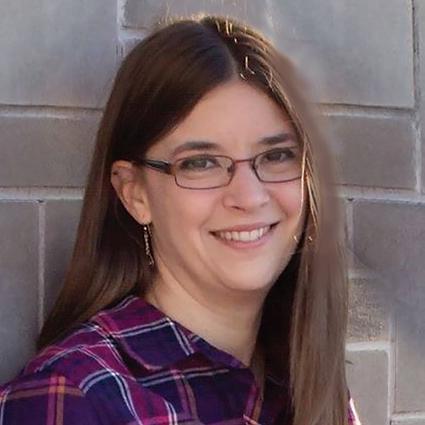
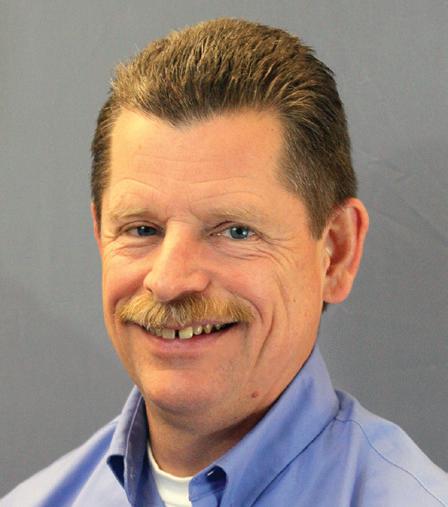
Unexpected tragedy strikes—that’s just life sometimes. As I write these words, I find myself writing with one hand while holding my 1-week-old baby girl in the NICU with the other arm. And I must say, this is a pretty odd place to be sitting. The emotional roller coaster of being thankful for a new baby, but also the fear and uncertainty as she is hooked up to multiple wires and tubes, has a way of rattling even the most confident adult.
In your community right now, there are multiple families sitting in a similar room. And to those families, small gestures can make a big difference. Here are a few fresh ways to support families with babies in the NICU:
• Recruit crafters at your church to crochet a bunch of baby hats, tiny blankets, socks, etc., and leave them at the nurses’ desk to be delivered to each room.
• Mobilize kids’ classes or families to collect materials for the waiting room, like puzzle books, small toys, coloring books, and crayons.
• Organize a book drive and have children’s books delivered to each room with a note written inside the front cover: “We’re praying for you.”
• Collect small teddy bears or soft toys for each baby.
• Create prayer request cards to leave at the nurses’ desk. Work it out with the hospital for a church staff member to pick up cards that have been filled out so your church’s prayer team can continue to pray.
• Is it near a holiday? Make (or take) a holiday-themed gift, like mini Christmas stockings or Valentine’s teddy bears.
• Gather a group to write encouragement notes with Scripture verses for the parents and siblings of the babies in the NICU.
You most likely will not be able to be in contact with the families themselves in the NICU, but instead will leave the items with the nurses. No matter what you do or take, be sure to include a hand-written note with a promise of your prayers, an invitation to worship at your church on Sunday, and something that shares the good news of Jesus.
“We chose our last interim while still in ‘panic mode’... and for a barista, he was a pretty good preacher.”
Autumn Wall is a church planter’s wife in Indianapolis and the daughter of Diana Davis, who originated “Fresh Ideas.” Autumn and her husband, Yale, have three children; their youngest, Kayleigh, is home from the NICU and doing well.
Consider how he might be calling you to new obedience.AUTUMN WALL

Family: I have a wonderful family that loves traveling and new experiences! My parents have lived overseas in Africa as medical missionaries and church planters since 1989 and I have four siblings currently spread out in four different U.S. states. My fiancée, Jennifer, and I are planning our wedding for this May.
Recent history: I moved to Springfield from Jackson, Tenn., where I graduated in 2017 from Union University with a B.A. in Digital Media Communications and a minor in Humanitarian Studies.
Favorite thing about church as a kid: One of the privileges of growing up in a Mozambican church is the worship experience. Music is infectious in Africa and the many voices in harmony—beautiful! The whole church sings with fervor and passion and in all dialects with little to no hymn books to follow along.
Illinois insight: When I first moved here, I was hesitant about the flatlands and the endless “amber waves of grain.” But as fall approached, it was precisely those features that caught my eye as I drove down Interstate 55 during sunset. I had never seen geese fly south through a purple, red, and orange sky over dusty corn fields.
Favorite Scriptures: Over the past couple of years, Romans 12:12 has been my anchor during challenging times. Ephesians 3:14-21 is also an encouragement and a good reminder of the power I have in prayer that I should offer towards my brothers and sisters in Christ. Isaiah 40 and 43 are humbling passages as they remind me of the omnipotence of God and his zealous love for his children.
St. John, USVI | As residents of the U.S. Virgin Islands continue to rebuild their lives after last year’s devastating hurricanes, Baptist leaders facilitated a series of events designed to share the gospel and meet immediate needs.
Adron Robinson, (right) president of IBSA and pastor of Hillcrest Baptist Church in Country Club Hills, was one of the preachers who participated in a December evangelistic crusade on St. John, one of the three U.S. Virgin Islands. The first “Feeding the Five Thousand” crusade, organized by Jeffery Singletary of the Florida Baptist Convention and facilitated with fellow Baptist leaders, was on St. Thomas in November. The final crusade was on St. Croix in late January.
All three of the islands were rocked by Hurricanes Irma and Maria, which both made landfall as Category 5 storms and left much of the territory without power for weeks. The damage is still very visible, Robinson said. Boats washed up on beaches, cars abandoned after flooding out, a restaurant still standing but with no roof.
“I knew they had four great needs—food, clothing, shelter and hope,” Singletary told Baptist Press. “Red Cross could help provide food and clothing. FEMA could help provide shelter. But

only the church of Jesus Christ can provide real hope.”
Ahead of the St. Croix event, 620 people had accepted Christ during the first two crusades, and more than 33,000 people had received bags of groceries and supplies.


Cory Matthews was ordained to ministry at Faith Baptist Church in Breese in October. Matthews, who is pastor of the church, has also served churches in Missouri. He is a graduate of Missouri University of Science and Technology and Midwestern Baptist Theological Seminary. He and his wife, Amy, have eight children ranging in age from 12 years to 2 months.
Robinson, who preached a sermon titled “Broken in a Beautiful Place,” noted the receptivity to the gospel he saw while in St. John.
“So many people were accepting Christ because they had been hit with two hurricanes—they knew that they weren’t in control,” Robinson said. “It’s kind of a wake-up call that God is in control. ‘We could have died. There’s got to be more to life than this.’ So they were really receptive to the gospel.”
– With reporting from Baptist Press
Find more information on ministry positions at IBSA.org/connect Send NetworkiNg items to IllinoisBaptist@IBSA.org
Faith Baptist Church in Marissa is seeking a bivocational pastor. Submit resumes to 1225 Schoolview Dr., Marissa, IL 62257, or e-mail Pam Welshans at pami_5@yahoo.com.
Baptist Children’s Home and Family Services is seeking a full-time (four days per week) husband and wife relief houseparent couple for two boys’ cottages. Send resumes to Melinda Bratcher at 949 County Road 1300 North, Carmi, IL 62821, or call (618) 382-4164, ext. 111.
First Baptist Church, Zeigler, is seeking a bivocational pastor. We desire a pastor whose ministry has a heart to seek God’s will, a love for the church family and community, and doctrinal integrity consistent with Baptist beliefs. Formal education is welcomed but will not be considered more important than these qualities. Please send resumes to First Baptist Church, 106 S. Pine St., Zeigler, IL 62999, or fbzsecretary@mchsi.com.
Emmanuel Baptist Church in Salem honored their pastor, Larry Shelton, and his wife, Janet, in November for 50 years of ministry in Illinois. Shelton is in his second pastorate at Emmanuel; he previously served there in the 1970s. He also pastored Bloom Southern Missionary Baptist Church in Flora, First Baptist Church, Odin, and Wamac Missionary Baptist Church in Centralia. The Sheltons have lived in Salem for more than four decades. Five students with Illinois ties received degrees in December from The Southern Baptist Theological Seminary in Louisville, Ky.:
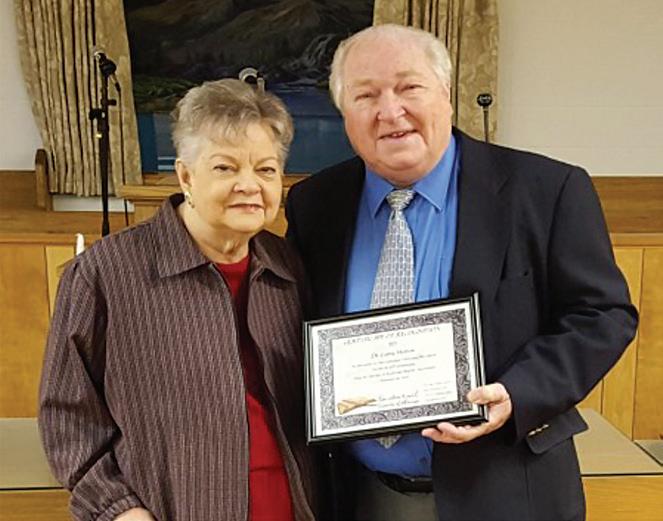
• Caleb D. Beaty, Bloomington, Master of Divinity
• Wyn S. Boerckel, Bloomington, Master of Divinity
• Joshua Cherry, Berwyn, Master of Divinity
• Andrew T. Hartmann, Troy, Master of Divinity
• Andrew K. Huette, Gridley, Doctor of Ministry
First Baptist Church, Dupo, is seeking a parttime youth minister. Send resumes to fbcdupo@ htc.net, with a subject line of Youth Minister Search Committee.
Winstanley Baptist Church in Fairview Heights is seeking a transitional (interim) pastor to preach in two Sunday morning worship services, lead weekly prayer meeting/Bible study, and work with ministerial staff, church council, deacons, and other committees to help guide this transitional period until a new pastor is called. Email resumes to search@winbap.org and direct questions to Search Committee Chair Jim Bryant, (618) 830-5527.
February 8
iConnect: IBSA/Pastors Meet-Up
What: Introduction to IBSA staff, ministries, training, and opportunities for pastors and church staff members
Where: IBSA Building, Springfield Info: TammyButler@IBSA.org
February 9-10
Unspoken: Men’s Conference Rebroadcast
What: Teaching from Johnny Hunt, pastor of FBC Woodstock, Ga.
Where: Machesney Park FBC Register: IBSA.org/Men
February 12-13
Women’s Ministry/Missions Leaders Essentials
What: Training for new local church women’s ministry leaders
Where: IBSA Building, Springfield Register: IBSA.org/Women
February 17
What: Learn to use technology for outreach and for worship
Where: IBSA Building, Springfield; 8:30 a.m.-1:30 p.m. Register: IBSA.org/Worship
February 19
What: Encouragement and renewal for pastors and wives
Where: IBSA Building, Springfield Info: RichCochran@IBSA.org
VBS Clinics
What: Learn about LIfeWay’s 2018 “Game On!” curriculum

• Feb. 24: Chatham Baptist Church
• March 3: FBC Carterville
• March 17: Pleasant Hill, Mt. Vernon
• April 7: Broadview Missionary Baptist
• April 21: Northside, Dixon
When: Registration begins at 8 a.m., clinics are 8:30-noon Register: IBSA.org/Kids
March 10
Children’s Missions Day
What: Hands-on missions projects for kids in grades 1-6
Where: Multiple locations Register: IBSA.org/Kids
March 23-24
Refresh: IBSA Ministers’ Wives Retreat
What: Weekend of fellowship and encouragement, featuring Kandi Gallaty, an author, speaker, and pastor’s wife
Where: IBSA Building, Springfield Register: IBSA.org/Women
March 23-24
Illinois Leadership Summit: Chicagoland
What: Training featuring NAMB’s Daniel Im and breakouts with top leadership practitioners from IBSA and Chicagoland Baptist churches
Where: Broadview Missionary Baptist Info: RichCochran@IBSA.org
Feb. 6: FBC Christopher; 5:15-9:00 p.m.
Feb. 16-17: Woodland, Peoria
March 2-3: Tabernacle, Decatur
20-21: Crosswinds, Plainfield
Mini-trainings offer Disaster Relief 101 and flood recovery classes. Two-day sessions include chaplaincy and intro courses beginning Friday evening, and specialty classes offered Saturday.

For more information and to register, go to IBSA.org/DR.
QDo you have a guideline ratio for mortgage debt to income?
AWhen it comes to buying a home, I always tell people to get a 15-year, fixed rate mortgage, with monthly payments that are no more than 25% of their take home pay. This type of mortgage is the only debt I don’t beat up people for having. Still, I urge folks to pay off these loans in less than 15 years.
The average person following my plan pays off this type of loan in about seven or eight years. That’s a pretty big deal in terms of your financial security. And paying extra on your mortgage doesn’t have to be a strain. You can start by simply rounding up your payments. If the payment is $770, make it $800 instead, and apply the extra to the principal balance. If you want to get more intense, you could make an extra house payment each quarter, or go the route of bi-weekly payments. To do this, simply make half a monthly payment every two weeks. By the end of the year you’ll have made 13 payments instead of 12. This will knock years off the length of your loan.
Remember, your income is your largest wealth building tool. It’s so much easier to save, invest, and give when all your money isn’t flying out the door to make payments!
Financial advisor Dave Ramsey is a prolific author and radio host.

QDo you recommend having gold and silver as part of your investment portfolio?
ANo, I do not. I also don’t recommend oil or corn futures. All of these are examples of commodities, and the commodities market is extremely volatile. In addition to the market being wildly volatile, the price on commodities isn’t based on actual production. It’s based largely on a supply and demand curve. If there’s a shortage on one of them, the price shoots up.
For example, when you’re talking about gold and silver, there’s more demand than supply when the economy is bad. In this kind of scenario, people are fearful and lots of them run to buy gold. This drives up the price to unrealistically high levels.
Again, the price on a commodity isn’t based on anything other than fear or greed, and a supply and demand curve. The prices aren’t based on an actual production of income, like it is with stocks or real estate.
I don’t buy commodities at all, especially gold and silver. I don’t recommend you buy them, either.
Location: Millstadt
Focus: Residents of this rural village with a population of around 4,000
Characteristics: Located in southwestern St. Clair County, Millstadt is home to many direct descendants of the village’s original settlers. It has experienced steady growth over the years, and combines the benefits of a small community with close proximity to the St. Louis metro area.

Prayer needs: A new church plant in Millstadt would best be served by a bivocational church planter who understands (or seeks to understand) rural life in a small town.

Read: Acts 6:1-7
As Illinois turns 200 in 2018, IBSA is seeking to engage at least 200 churches in each of these challenges. Is your church one of them?

Read
QWith healthcare costs rising, some church members are suggesting either I should go bivocational or my wife should work full-time to get benefits for us, saving the church a lot of money. Is it right for the church to expect another business to pay for their pastor’s insurance?

Sometimes the smallest issues can cause great problems. In Acts 6, one complaint from the congregation threatens to disrupt the inward unity and outward growth of the early church.

How the leaders handled this conflict demonstrates valuable principles of biblical leadership for us all. So often in life and ministry we seek to avoid conflict, but God uses conflict as a crucible for building character in believers.
First, we must confront the conflict. The disciples didn’t ignore the issue by saying “We will pray about it.” They confronted the issue in order to get back to preaching and prayer. Once we choose to confront we have two choices: confronting in Christ or confronting in our flesh. Biblical leadership must confront conflict in a godly manner.
ADRON ROBINSONNext, the disciples developed unity across cultural lines. They understood that ethnic divisions couldn’t be maintained in a community that confesses a Messiah who died to make us all one family.
Finally, the disciples prioritized responsibilities. Leaders must prioritize what they are called to do and delegate what they are not. Empower your congregation to fulfill their calling, while you fulfill yours.
Biblical leaders must follow God’s word and guide the church, because God is more concerned about the character of our churches than the size of our churches.
PRAYER PROMPT: Lord, may we stand on your word and yield to your Spirit as we confront conflict in a God-glorifying way, that your church may grow according to your will and be a witness to a watching world.
Adron Robinson is pastor of Hillcrest Baptist Church in Country Club Hills and president of the Illinois Baptist State Association.
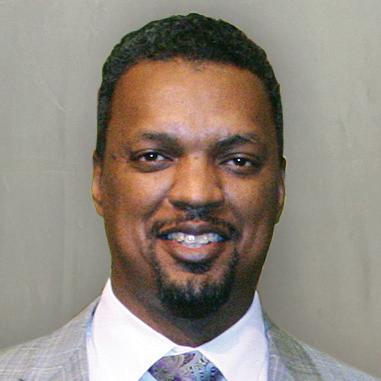 PAT PAJAK
PAT PAJAK
ADepending on the size and financial situation of the church, what you mentioned may be the only option. Health insurance, on the other hand, is not an option. One major family health issue can devastate a pastor’s financial life for years. A church should provide whatever it can to meet the needs of their pastor. In some cases, sharing the financial burden is an option. If a spouse’s place of business provides coverage, that should not be viewed as them providing for the church’s responsibility, but as a blessing from the Lord. Be open to the options that are available.
VP Mike Pence got criticized in Washington for refusing to meet with women alone. It unfairly excluded women from key meetings, some people said. Beyond having a window in the office door, how does a pastor handle a staff of men and women, without seeming to exclude the women sometimes?
Vice President Pence made his decision to protect the integrity of his position. Pastors need to do the same thing.
There will be times when a pastor has to meet with a female staff member or a female church member. He should always keep the desk between him and the woman. He should avoid anything more than a handshake when alone with her. (A public hug might be allowed with others around when consoling or congratulating her.)
Within the context of a meeting, set a time limit and let an administrative assistant know how long you will be in a one-on-one situation. Above all, simply be a man of integrity.

Pat Pajak is IBSA’s associate executive director for evangelism. Send questions for Pat to IllinoisBaptist@ IBSA.org.
